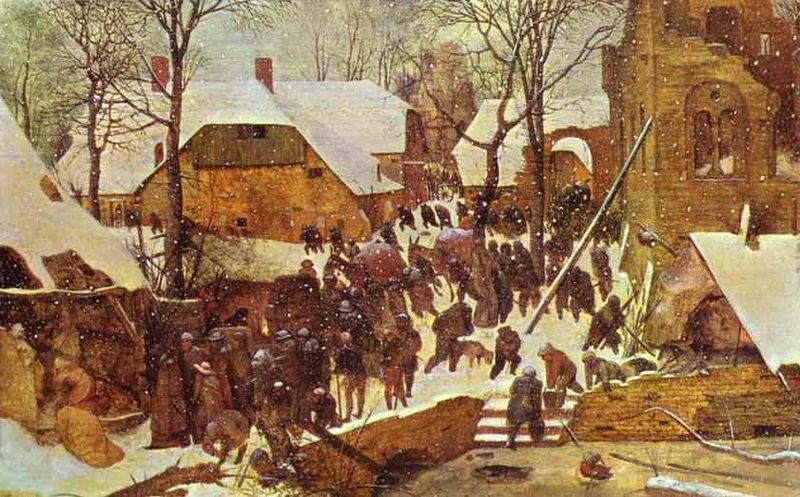 By Anita Davison
By Anita Davison Hogmanay evolved from several pagan celebrations, namely: the Norse winter solstice, the Gaelic Samhain, and the Roman Saturnalia, the Vikings Yule, which later contributed to the Twelve Days of Christmas, or as the Scots referred to them, the "Daft Days". There was also the Norman French "hoguinané" which survives on Guernsey as "hoginono", "aguillanneuf, meaning the "eve of the new year", or "homme est né" meaning "Man is born".
Hogmanay evolved from several pagan celebrations, namely: the Norse winter solstice, the Gaelic Samhain, and the Roman Saturnalia, the Vikings Yule, which later contributed to the Twelve Days of Christmas, or as the Scots referred to them, the "Daft Days". There was also the Norman French "hoguinané" which survives on Guernsey as "hoginono", "aguillanneuf, meaning the "eve of the new year", or "homme est né" meaning "Man is born".
Immigrant weavers from the Low Countries had the Flemish "hoog min dag", "great love day", and Anglo-Saxons, "haleg monath", "holy Month", or Gaelic, "oge maidne", "new morning".
During the Roman celebration of Saturnalia, slaves would switch roles with their masters for the feast, a practice that continued in the Medieval Catholic Church where young monks were waited on by priests during the 12 days of Christmas. This tradition is also observed in Scottish army regiments, with officers waiting on the men at special dinners.
During the Middle Ages, the pagan winter festivals were overshadowed by the feasts surrounding Christmas, and the New Year was moved to coincide with Christian holy days. Following the reformation in Scotland, after 1638, the General Assembly set Christmas aside, so the gift-giving and took place at New Year and gave rise to the uniquely Scottish celebration of Hogmanay. In 1693 the church recorded:
"It is ordinary among some Plebians in the South of Scotland, to go about from door to door upon New Year`s Eve, crying Hagmane."
Christmas was also banned in England and Wales during the interregnum under Oliver Cromwell, but in Scotland, Christmas was not celebrated for almost 400 years, only developing with returning prosperity after WWII.
The best known tradition is the linking of arms for the last verse of "For Auld Lang Syne"
For auld lang syne, my dear,
For auld lang syne,
We'll tak a cup of kindness yet,
For auld lang syne!
The second famous Scottish New Year custom is, ‘first footing, where the first person to cross the threshold of a friend or neighbour after midnight with the giving of symbolic gifts such as salt, coal, shortbread, whisky, and black bun (a rich fruit cake) intended to bring certain kinds of luck to the recipient. Food and drink are offered to the guests, and this ritual continues into the early hours of January 1st. Traditionally, tall dark men are preferred as the first-foot which, it is said, echoes a time when a blonde-haired stranger on one's doorstep meant a visit from Viking raiders, and spelt bad luck.
Many Scottish towns have their own traditions, for instance, in Stonehaven, just south of Aberdeen, the locals make up giant 'balls' of chicken wire filled with old newspaper, sticks, rags, and flammable material. Spectators are entertained by a ‘fire poi’, a pipe band, and street drumming, and as the Old Town House bell rings in the new year, the balls are set alight and the ‘swingers’ set off up the High Street from the Mercat Cross to the Cannon and back, swinging 20 pound burning balls on five foot poles around their heads.
This custom stemmed from a pre-Christian custom of the Winter Solstice where fireballs signified the power of the sun, to purify the world and consume evil spirits. Any fireballs still burning at the end of the ceremony are cast into the harbour, followed by a firework display.
This custom stemmed from a pre-Christian custom of the Winter Solstice where fireballs signified the power of the sun, to purify the world and consume evil spirits. Any fireballs still burning at the end of the ceremony are cast into the harbour, followed by a firework display.
In Burghead in Moray, there is the ‘burning the clavie’; a cask or basket filled with tar, lit and carried flaming round the village and up to a headland upon which stands the ruins of an altar, the Douro. When the burning tar-barrel falls apart, spectators scramble for a lighted piece with which to kindle the New Year's fire on their cottage hearth. The charcoal of the ‘clavie’ is collected and pieces put up chimneys to keep spirits and witches from coming down.
In the Highlands, celebrations include the saining (Scots for 'protecting, blessing') of the household and livestock. Early on New Year's morning, householders firstly drink, then sprinkle 'magic water' from 'a dead and living ford' around the house (a river ford routinely crossed by both the living and the dead). The house is sealed up and lit branches of juniper carried through the house and byre. When everyone is coughing and sneezing, the doors and windows are flung open to let in the fresh air of the new year. The woman of the house then administers 'a restorative' from the whisky bottle, and the household sits down to its New Year breakfast.
Hogmanay and Ne'erday [New Years Day] are regarded as more important than Christmas, and although Edinburgh has no historical connection with Norse invaders, a Viking longship is burned during the Ne’erday celebrations.
On the Isle of Lewis, in the Outer Hebrides, young boys form themselves into opposing bands, the leader of each wears a sheep skin, while a member carries a sack. The bands move through the village from house to house reciting a Gaelic rhyme. On being invited inside, the leader walks clockwise around the fire, while everyone hits the skin with sticks. The boys would be given some bannocks - fruit buns - for their sack before moving on to the next house.
The first Monday of the New Year in Scotland was called Handsel Day, celebrated by an employer giving presents to his staff, parents to their children and teachers to their students, and a roast dinner eaten. Handsel was the word for gift box, although this tradition has died out in modern day Scotland.
In Shetland, ‘Up Helly A’ began in the 1880’s in Lerwick, on the last Tuesday in January. A series of marches and visitations, it culminates in a torch-lit procession and a party where a Viking galley is set alight.
Cited from www.scotland.org
 Anita Davison is an historical fiction author with a love of 17th century England. DUKING DAYS: REBELLION was released in 2007 and the sequel, DUKING DAYS: REVOLUTION in 2008. TRENCARROW SECRET, a Victorian Gothic romance, is available from MuseItUp Publishing.
Anita Davison is an historical fiction author with a love of 17th century England. DUKING DAYS: REBELLION was released in 2007 and the sequel, DUKING DAYS: REVOLUTION in 2008. TRENCARROW SECRET, a Victorian Gothic romance, is available from MuseItUp Publishing.


 By
By 






